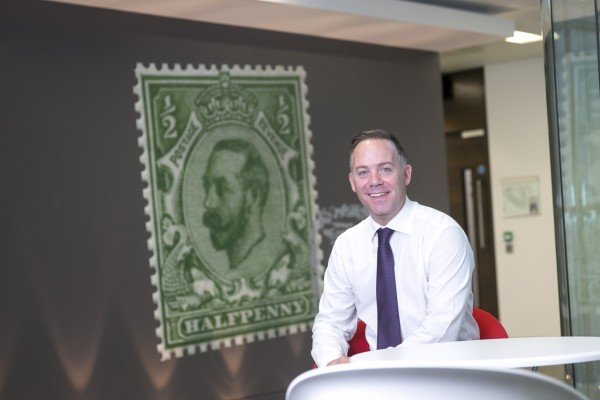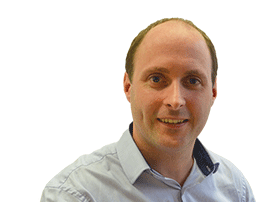 Andy Cartland, founder and MD at Acre, the market leader in sustainability and safety recruitment, speaks to Shaun Davis, group director of safety, health, wellbeing and sustainability at Royal Mail Group about his love of learning and the importance of employee health and wellbeing.
Andy Cartland, founder and MD at Acre, the market leader in sustainability and safety recruitment, speaks to Shaun Davis, group director of safety, health, wellbeing and sustainability at Royal Mail Group about his love of learning and the importance of employee health and wellbeing.
Andy: Your remit is quite broad, covering safety, health, wellbeing and sustainability. Do you identify yourself as a H&S professional or a sustainability professional?
Shaun: I’d describe myself as a business professional with a safety, health and environmental bias. As I see it, my role is about making a positive contribution to the success of the business while protecting the people who work for it and the environment we all share. That’s really where the worlds of H&S, environment and sustainability come together, because in my mind, sustainability is built first and foremost on an organisation’s commitment to keep people safe and well. What better way to demonstrate a sustainability mindset than protecting the very people that make the organisation what it is.
Andy: What do you think are the advantages of putting H&S and sustainability together into one role?
Shaun: I’ve seen HSE (health, safety and environment) become a lot more integrated over the past 10 years and I think there’s a certainly a trend for more SHEQ (safety, health, environment and quality) roles.
There’s so much cross over between the disciplines. If you’re on site doing a safety inspection, it makes sense to be able to assess the environmental impacts while you’re there. It makes the role that much richer for the individual and the core skills involved, the ability to assess, audit, coach and challenge are usually the same, so it’s a natural fit. It also supports the operation as they can get on and do their day job without repetitive interruptions to do audits/inspections from different areas; an integrated approach avoids duplication and is more effective and efficient in my view.
Andy: You do a lot of coaching and mentoring in your role. What advice would you offer to people looking to take their career to the next level?
There’s little benefit in my view to piling one safety qualification on top of another one. Once you have a core foundation in safety, the investment is better made in other disciplines, be that quality, environment or even HR or leadership.
Andy: Is that the reason you have four post-graduate degrees?
Shaun: [laughs] That’s partly the case, yes. I’ve always loved learning new things, but my main reason for studying was so that I could have conversations with people from different parts of the business and be able to see things from their perspective. Now when I speak to the finance, marketing or HR director, I’ve got a much better understanding of their priorities and view points. That’s what learning does – it gives you new perspectives and also gives you an appreciation of other peoples priorities – not to mention an opportunity to challenge and debate.
Andy: You’re also conducting research for a doctorate in coaching and mentoring. Are you able to share some findings?
Shaun: I’ve just submitted my research which is looking at coaching, well-being and organisational culture at the Royal Mail. One of my main findings is around the important role a line manager can play in the mentoring relationship. I’m planning to publish the research next year and hopefully turn the key findings into a handbook for practitioners.
Andy: Health is an increasingly important issue, not just for business, but for UK PLC overall. Do you think it’s getting enough attention?
Shaun: I’ve always felt that health was underrepresented in the health and safety equation. It’s usually 90 percent safety and 10 percent health, which is why I’ve always advocated for a more balanced approach.
Keeping people safe is incredibly important, but so too is keeping people healthy. Prevention plays a key role on both fronts so it’s really about having the strategies in place to help support people before a problem arises.
Andy: How do you approach wellbeing at Royal Mail?
Shaun: Our CEO, Moya Greene is incredibly passionate about promoting wellbeing within the business – especially mental health. Our ‘Feeling First Class’ employee health and wellbeing strategy covers a wide range of initiatives from First Class Fitness, First Class Driving and most recently, First Class Mental Health, which we launched last October – in conjunction with our unions.
Andy: On a national level, mental health is gaining increasing recognition as a serious health issue. How have employees reacted to the First Class Mental Health programme?
Shaun: The response has been incredibly positive. About a quarter of the population will experience some kind of mental health problem in the course of a year, with mixed anxiety and depression the most common mental disorder in Britain. This is a national issue and one that people are finally starting to talk openly about. When we told people we were producing a set of mental health awareness videos last year, we had employees contact us and ask that their stories be used in the videos so that their experiences could help others.
We’re also working with other large organisations to shape the workplace wellbeing agenda in the UK through Business in the Community’s Mental Health Champions Group and have signed the Time to Change Pledge to publically commit to ending the stigma of mental health conditions in the workplace.
Andy: With such a huge workforce, how do you get the First Class Mental Health message out there?
Shaun: It’s not just to scale, but also the diversity. We have people in offices, in sorting offices and out on the road so it’s really just a matter of understanding what method is going to work best. For some people it’s via conversations with their line manager and finding resources on the intranet. We reach others via newsletters, letters and our magazine. We’re currently piloting an App that will give people access to the information while on the move and will be rolling it out to all our frontline operations in the UK next year.
Andy: You’ve spoken previously about the need for language to change in H&S – can you say a bit more about this?
Shaun: I’ve always been interested in language so I studied NLP (neuro-linguistic programming) which looks at how language, neurological processes and behaviour interact.
I think safety in particular can be quite elitist in its language and that creates barriers. The point of communication is to be understood, but that won’t happen if we continue to use jargon only other safety professionals understand. Why, for instance do we talk about accident rates just in percentage terms? Or frequency rates? In doing so we seem to completely overlook the people involved. When we humanise the language we immediately improve the engagement.
Andy: Finally, what advice would you give to fellow practitioners in H&S?
Shaun: Follow your gut instinct and don’t wait for the perfect plan, strategy or business case. Just do it. You may need to correct and adapt along the way, but the time really is now. When you work this way you’ll be surprised at what you can achieve.
People often say “Safety is just common sense” – I heard a great saying last week “Common sense isn’t common until it becomes common knowledge” I love this and see our role as practitioners to make safety common knowledge to everyone.
 Shaun Davis is Group Director of Safety, Health, Wellbeing & Sustainability at Royal Mail Group, joining in the organisation in September 2012.
Shaun Davis is Group Director of Safety, Health, Wellbeing & Sustainability at Royal Mail Group, joining in the organisation in September 2012.
Prior to Royal Mail Group, Shaun worked in the construction and waste management sectors and led organisations to achieve significant improvements in performance.
Shaun has also led culture change programmes and has achieved a variety of awards and accolades for the organisations he has worked in.
Shaun holds a Master of Arts Degree in Leadership & Change Management, The WWF ‘One Planet’ sustainability focused Master Degree in Business Administration (MBA), a Master of Arts Degree in Marketing & Innovation and a Master of Science Degree in Workplace Health & Wellbeing, which complement his numerous technical qualifications.
 Andy Cartland is founder and MD at Acre, the market leader in sustainability and safety recruitment for over a decade. Andy is also a trustee for Global Action Plan a charity that brings people together and inspires them to take practical environmental action, and an advisor to social impact consultancy, Uscreates.
Andy Cartland is founder and MD at Acre, the market leader in sustainability and safety recruitment for over a decade. Andy is also a trustee for Global Action Plan a charity that brings people together and inspires them to take practical environmental action, and an advisor to social impact consultancy, Uscreates.
What makes us susceptible to burnout?
In this episode of the Safety & Health Podcast, ‘Burnout, stress and being human’, Heather Beach is joined by Stacy Thomson to discuss burnout, perfectionism and how to deal with burnout as an individual, as management and as an organisation.
We provide an insight on how to tackle burnout and why mental health is such a taboo subject, particularly in the workplace.

 Andy Cartland, founder and MD at
Andy Cartland, founder and MD at  Shaun Davis is Group Director of Safety, Health, Wellbeing & Sustainability at Royal Mail Group, joining in the organisation in September 2012.
Shaun Davis is Group Director of Safety, Health, Wellbeing & Sustainability at Royal Mail Group, joining in the organisation in September 2012.
